
Let's Put It into Context
- The cursed thought they were sheep. “Then they also will answer, saying, ‘Lord, when did we see you hungry or thirsty or a stranger or naked or sick or in prison, and did not minister to you?’” (Mt. 25: 44 ESV emphasis added). The goats thought they were doing enough to earn salvation (The Difference between Outward and Inward Religion).
- The Matthew 7: 21 people thought they were, too. “Not everyone who says to me, ‘Lord, Lord,’ will enter the kingdom of heaven, but the one who does the will of my Father who is in heaven” (Mt. 7: 21 ESV) (The Difference between Outward and Inward Religion).
Main Nugget
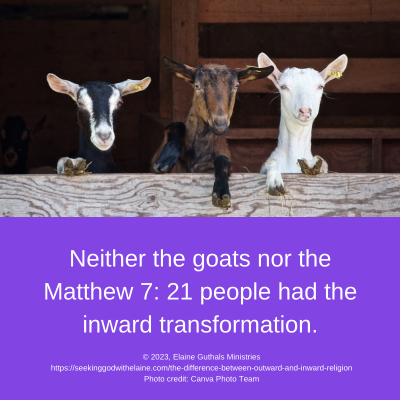

Forming Our Habits to Grow Our Relationship with God
- God does not want us to not accept His salvation (The Difference between Outward and Inward Religion).
- Salvation starts with grace, but it doesn’t end there (Different Effects of the Religion which Those Profess).
- Our character is a reflection of His. Salvation does not make us gods in our own right. It means we serve the One true God (Different Effects of the Religion which Those Profess).
- God comes to us as we are. He calls us to repentance and salvation (Different Effects of the Religion which Those Profess).
- Salvation is free. Sanctification is going to cost us. It is going to cost us to become rooted and grounded (Coming to Religion Differently).
- The power leading to transformation is real, and it can transform us to walk in God’s Spirit and obey His laws and commandments that produces a moral likeness of God (What Is Outward Religion?).
- God wants us to focus on the spiritual, inward transformation rather than the outward religion (Different Feelings in Religion).
- God isn’t looking for just outward service. Service is included in the list of things that God requires. But so is to walk with God (What Is Outward Religion?).
- God can’t change His character. If the laws are based on Him, the standard can’t be lowered (Prayers as Outward Religion).
- Religion isn’t true religion if we do not give up what is contrary to what Jesus teaches. Those contrary things must be replaced by a contrite heart (Prayers as Outward Religion).
- God has the power to make us humble and give us a contrite heart. He looks on us in acceptance. When we are contrite in spirit, we tremble at God’s Word (Prayers as Outward Religion).
- God had the sacrifices for a purpose. We all know that sacrifices taught them – and us – that blood needed to be shed for remission of sins. There was another purpose. They were to build a communion with God. That is what prayer does (Prayers as Outward Religion).
- God reveals everything to us. He shows us the way in which our sins are forgiven. He then tells us what He wants us to do with it: witness — telling others about Jesus (Different Feelings in Religion).
- Jesus knew it was going to be hard to follow Him. We have to give up our sins. We have to change our mindset from what we think is God’s religion to accept what really is His religion. Sometimes, that means giving up associating with people who are important to us (Coming to Religion Differently).
- If we offer to God a prayer that is not acceptable, we are killing our relationship with Him (Prayers as Outward Religion).
- Godliness with contentment keeps our focus on God. We don’t elevate ourselves; rather we exalt God (Different Feelings in Religion).
- Remorse brings the bitterness. We must grieve that we have disobeyed God (Different Feelings in Religion).
- The goal of sanctification is to change our character to be like God’s. We aren’t like Him when we are in our sinful state. God doesn’t flip a switch and make us like Him at conversion (Different Effects of the Religion which Those Profess).
- Sanctification is a gradual growing process. We are gaining wisdom, holiness, and happiness (Different Effects of the Religion which Those Profess).
- We have to realize, though, that as the process begins from within – and it is a process – it is going to take a while for worldview people to see the total effect of the change. When they say they don’t see us imitating Christ, it is because we are a work in progress – or they are looking at it the wrong way (Exercises about Their Soul’s Case).
- The whole purpose of sanctification is to change our character to be like God’s. We do that by enduring temptation. Yes, God wants us to choose not to sin. But right now I am thinking that enduring means we don’t lose our dependence and belief in Him. If we know we are going to continue to sin, the enduring can’t mean that we are expected to do everything right. It has to mean we keep a right relationship with God (Different Principles, Motives, and Ends).
- How do we lose grace? We don’t resist Satan’s temptation. We, instead, get caught up in the world’s snares. These corrupts our hearts (Instead of Growing, Some Disciples Grow Worse and Worse).
- What we gain is so much more when we accept Jesus. Those cost of refusing to believe in Jesus is devastating (Coming to Religion Differently).
Glossary

Forming Our Habits to Grow Our Maturity
- It isn’t just the outward actions that earn us salvation. It is the inward transformation (The Difference between Outward and Inward Religion).
- Believing in God and following Him is what we are commanded to do (What Is Outward Religion?).
- One of the duties we have to God when we accept His gift of salvation is to continue to hear His laws and commandments. Notice, Proverbs 28: 9 talks about hearing His law, not doing the law (Prayers as Outward Religion).
- Our salvation really isn’t about knowledge. It is about faith. We’ve got to be content with the lack of knowledge. Our contentment is forged in our submission (Different Feelings in Religion).
- It is our choice to accept salvation or not. It is also our choice as to what we do with it. What we do with it is sanctification (Different Effects of the Religion which Those Profess).
- We’re not going to get it on our own (Prayers as Outward Religion).
- Too many times, we think it is a one-and-done conversion.Oh, yes. Our acceptance of God’s Plan of Salvation is a one-time deal. But that is the start of the Sanctification Road (Instead of Growing, Some Disciples Grow Worse and Worse).
- Our part is choosing for this transformation to take place. Then, we have to be willing to follow God’s Will and walk in the Spirit. Will this be a 100% perfect-in-the-Spirit deal? No, we will still sin, unfortunately. But we can ask forgiveness when we do (Exercises about Their Soul’s Case).
- We must be vigilant. God is always telling us to watch. We have to realize that Satan is going to try infiltrate us. Satan comes in when everyone is sleeping — i.e., not watching. He doesn’t need the instant gratification we think we deserve when we do something. He is okay with the long haul (The Difference between Outward and Inward Religion).
- We take the focus off of hearing what we should be doing. Pretty soon, we are doing the opposite (Prayers as Outward Religion).
- We want to be godly and righteous. We want to imitate Jesus, Who’s godliness and righteousness were at the heart level (What Is Outward Religion?).
- It is we who choose to do the exact opposite of what God wants from us. We have to choose for or against God (Prayers as Outward Religion).
- We can’t substitute what we consider is a good prayer and think God will just have to accept it. We can’t pretend we are praying to God but be putting our affections on worldview things (Prayers as Outward Religion).
- Our sacrifices – as our prayers – if done in the wrong way, are not acceptable to God (Prayers as Outward Religion).
- Only those who believe in Jesus have joy. We only find joy when we have forgiveness of our sins. That only comes through a reconciliation with God (Different Feelings in Religion).
- We have to choose to turn away from sin and turn toward the Son. We have to choose to turn away from the world and turn to God (Different Effects of the Religion which Those Profess).
- Lack of perseverance and increased indifference may be the symptoms, but Matthew 24: 12 tells us the root cause — sin (Instead of Growing, Some Disciples Grow Worse and Worse).
- The power isn’t to gain us worldly things. It is to grow our holiness and godly love (What Is Outward Religion?).
- Only by keeping the greatest commandments are we perfected. In other words, we have to believe and follow (What Is Outward Religion?).
- We are called to give our best to God and shouldn’t be surprised that our prayer life suffers when we don’t (Prayers as Outward Religion).
- We said sanctification is about growing. We are growing in our understanding of the truth. God is revealing Himself to us. One thing God is revealing to us is how we are to habitually live for Him. We must be holy because He is holy (I Pet. 1: 16) (Different Effects of the Religion which Those Profess).
- Growing is all about growing grace. We want to grow God’s favor toward us. It isn’t about us being better people. Nor is it about us doing a better job of serving others. It is about us growing closer to God (Different Effects of the Religion which Those Profess).
- Many times, we think that bearing fruit means witnessing. That isn’t everything. Don’t get me wrong. We are to witness and bring others to Christ. We are to serve others. Our #1 priority is getting our relationship right with God (Different Effects of the Religion which Those Profess).
- Our prayers must be humble and contrite, offered in the way found acceptable by God, not as sacrifices (Prayers as Outward Religion).
- Our character must show through our prayers. That character must be like God’s (Prayers as Outward Religion).
- We must conduct our prayer lives not as the Israelites performed their sacrifices but through inward devotion (Prayers as Outward Religion).
- It is a mystery because godliness has nothing to do with us really. It is about us being obedient to the gospel (Different Feelings in Religion).
- Why is it so important that there is this mystery? It isn’t about knowledge or following the checklist. It is about obedience. We have to obey regardless of what our physical, sinful nature is telling us to show our contrition for disobeying Him in the first place (Different Feelings in Religion).
- We have to know ourselves. If we don’t — or are being delusional about who and what we are — we aren’t letting God work in us (Different Feelings in Religion).
- Yes, even disciples are going to have anxiety, disquiet, and sorrow. God didn’t promise us a rose garden, especially after we turned away from the Garden He did give us (Different Feelings in Religion).
- I do believe there is no doubt of the outcome when we choose God every day. We will become more and more like Him. We just may have trouble seeing that (Different Effects of the Religion which Those Profess).
- We don’t lose our personality. We don’t become robots for God. We become uniquely us who look like Him (Different Effects of the Religion which Those Profess).
- Indifference comes from our love of God failing (Instead of Growing, Some Disciples Grow Worse and Worse).
- Many of us are casual about our relationships with God. We are casual about a lot of things. We may not have given a lot of thought about what it really means to be a disciple of Christ. Maybe we decided it was more than we signed up for. It could be that we are uninvolved. You know, it takes a big commitment to search for and seek God.
- Jesus wants us to be more than lukewarm – either way. It is easy to think that Jesus wants us to be either hot or cold. But that isn’t really right. Jesus wants us to gain salvation. Jesus would prefer that we be hot, not cold. Being lukewarm gains us nothing. (Instead of Growing, Some Disciples Grow Worse and Worse).
- Part of being lukewarm means our prayers hit the ceiling. The reason may be that our hearts aren’t in it. We aren’t worshiping in the spirit (Instead of Growing, Some Disciples Grow Worse and Worse).
- We have to persevere, not give into feelings of indifference (Instead of Growing, Some Disciples Grow Worse and Worse).
- We get out of religion what we put into it (Coming to Religion Differently).
- We all have different reasons for seeking God. Some may just want salvation from the horrible thing they are going through at the moment. Others might like the principle of God, as we talked about in the last devotion, but not the reality of submitting to that God. Then we have those that just want the fire insurance (Coming to Religion Differently).
- Inward, we are living according to God’s standards in His perfect Will. Outward, our souls are experiencing varying degrees of being out of compliance with those standards (Coming to Religion Differently).
- We have to search for and seek God. We search for Him when He isn’t our Father, and we continue to seek Him when He is (Coming to Religion Differently).
- Our convictions can’t be at the surface level but must rather be at the heart level (The Depth of Our Convictions).
- We have to have depth of conviction. It all boils down to the depth of our conviction that sin is evil. If we don’t think sin is wrong or that something is a sin, we won’t have the depth of conviction need to have. We also have to have depth of humiliation. No, we aren’t talking about how embarrassed we are going to be. Yes, we may be personally mortified, but we have to mortify our sins (The Depth of Our Convictions).
- When we love God and live as He calls us to, we have the hope of reward. When we have an inward religion and have submitted to a relationship with God, disciples will be rewarded. This is because we have navigated the Sanctification Road (Different Principles, Motives, and Ends).
- Trials are meant to grow our faith. Growing our faith gets us closer to being a mature disciple (Different Principles, Motives, and Ends).
- Enduring the trials will take patience. We can’t get mad at God and threaten to withdraw our faith from Him. We have to grow an unwavering faith (Different Principles, Motives, and Ends).
Glossary

Forming Our Habits to Grow Our Relationship with Others
- In the Day of the Lord, the net will sweep up everyone — believer and non-believers and everyone in between (The Difference between Outward and Inward Religion).
- The church is made up of a variety of people. If non-believers aren’t in the church, they won’t hear the Plan of Salvation. We know disciples are at differing places along the Navigational Road. Those who are believers have differing skills and abilities (The Difference between Outward and Inward Religion).

Miscellaneous
- To spend eternity with God, we have to be blameless (Death, Common to All, Leads to Eternity).
- When we read Psalm 37: 37-38, we question how anyone can be blameless. We think that means we have to have 100% of the desirable characteristics as good all the time. But thinking we won’t sin anymore isn’t correct. No one can be 100% sinless — only Jesus because He was God’s Son. Instead, it is a growing process. We have to be growing in knowledge and grace (II Pet. 3: 18 ESV) (Death, Common to All, Leads to Eternity).
- What is the purpose of these rituals? It helps us put the workings of our hearts into action (Ways of Professing Religion).
Sheep
- True disciples have to make an inward transformation. They have to have a form of godliness. While in these sinful bodies, our godliness — and righteousness — is only a form. We will not truly be godly — or righteous — until we are changed when we are resurrected. But we have to have that form of godliness in order to have salvation (The Difference between Outward and Inward Religion; What Is Outward Religion?).
- The problem we have is that we think we have to have the godliness of God now. We think that, once we make a profession of faith, we should not be able to sin. Then we do.
- We kick ourselves and kick ourselves. No, sinning is not right. Kicking ourselves isn’t right, either. Our goal in this life is to navigate the Sanctification Road so that we may become like God. It is a process, not a flip-the-switch occurrence (What Is Outward Religion?).
- It comes down to our attitude. Are we trying to follow God’s laws and commandments, or are we trying to rewrite God’s Word? (What Is Outward Religion?)
- We must choose to follow God and repent when we don’t (What Is Outward Religion?).
- We have to personally know God by having a close relationship with Him. This knowledge must be validated by our implementing His laws and commandments in our lives exactly as He intends them. Implementation into our lives requires our thoughts and actions be in sync with our words (What Is Outward Religion?).
- Inward religion comes from a deep conviction of God’s saving power (The Depth of Our Convictions).
- The depths of our convictions are so deep, the joy bubbles out of us. That joy leads to witnessing and fearing fruit (The Depth of Our Convictions).
- Getting a new heart is a requirement for all disciples (Exercises about Their Soul’s Case).
- The ones who are listening to God’s Word accept it. In fact, Jesus said they received it with joy. The problem is that the stony heart remains (Exercises about Their Soul’s Case).
- We are growing our love for God, not just doing the do’s and not doing the don’ts (Different Principles, Motives, and Ends).
- Enduring can mean a couple of things. Yes, it means making it through. I think it also means making it through when we lose (Different Principles, Motives, and Ends).
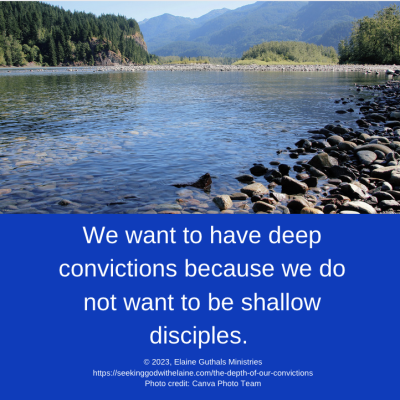
Matthew 7: 21 People
- But there are too many church members out there who are missing Jesus. They are compromising with Satan and trying to rewrite God’s Word. They aren’t teaching those with whom they come into contact about God (The Difference between Outward and Inward Religion).
- I don’t read the Tares and the Weeds Parable to say the church did anything to cause the infiltration. Satan snuck in and planted his seed (The Difference between Outward and Inward Religion).
- Both builders knew the building should be built but went about it in different ways. Non-believers wouldn’t be building the building. One chose not to follow Jesus’ words (The Difference between Outward and Inward Religion).
- Believers can be those who only believe but are not growing. Disciples are students who are growing (The Difference between Outward and Inward Religion).
- Those who have made a profession of faith once — albeit not genuine — will — hopefully — be more open to making a real profession (The Difference between Outward and Inward Religion).
- Following God and not believing in Him won’t cut it (What Is Outward Religion?).
- If non-believers are on one end of the line and true disciples on the other end of the line, those who have the appearance of godliness – but it is only an appearance – are in the middle (What Is Outward Religion?).
- Believing in God and not following Him won’t cut it (What Is Outward Religion?).
- Bottom line is belief is not enough. Belief in our Savior and Redeemer has to permeate our being and impact out thoughts and actions. To do any less denies Jesus’ teaching (What Is Outward Religion?).
- We can’t pretend to be religious to exalt ourselves. We must exalt God in all ways (What Is Outward Religion?).
- A lukewarm believer is not following Jesus as He requires (Instead of Growing, Some Disciples Grow Worse and Worse).
- Since the verse in Revelation looks at the church of Laodicea, we are going to assume they made what they thought was a genuine profession of faith (Instead of Growing, Some Disciples Grow Worse and Worse).
- Lukewarm means that we are not growing. We are not seeking to get closer to God. We may just be trying to remain status quo (Instead of Growing, Some Disciples Grow Worse and Worse).
- We’ve got to grow, or we don’t live. That is the opposite of losing (Instead of Growing, Some Disciples Grow Worse and Worse).
- In order to grow, we have to pursue the path of Light – Jesus (Instead of Growing, Some Disciples Grow Worse and Worse).
- The problem is that there is no guarantee for growth — even for those who have accepted Jesus as our Savior (Death, Common to All, Leads to Eternity).
- When we make a genuine profession of faith, we can never lose our salvation.
- The key word is genuine. If we do not make a genuine profession of faith, we can lose our salvation (Death, Common to All, Leads to Eternity).
- We have to question whether we were really saved or not if we don’t face the hardships. Satan isn’t going to go after someone who is already His. He is going to attack someone who is a child of God (Coming to Religion Differently).
- We take detours on the Sanctification Road when we allow the stone in our hearts to freeze out God (Exercises about Their Soul’s Case).
- Is it those who don’t persist who are the Matthew 7: 21 people? It would make sense. They are not progressing to have God’s character. We must have God’s character to enter Heaven (Ways of Professing Religion).

Goats
- Non-believers are already condemned. If they refuse to believe, nothing is going to change their minds (The Difference between Outward and Inward Religion).
- The goats are those who are cursed (The Difference between Outward and Inward Religion).
- Goats appreciate the actions, not the commandment to love God above everything else. Wasn’t that what the goats did? They didn’t love God. They loved the principle of God, not Him. They love — if they believe there is a God — that God is love. They love that we can be good people and do random acts of kindness for others. They think that should be enough. They just blow by the fact that we have to submit to Jesus as Savior and Redeemer (Death, Common to All, Leads to Eternity).
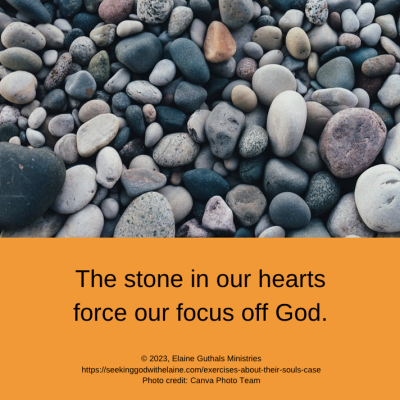
Rooted and Planted
- Becoming rooted is taking away our love of sin. It is an inward process rather than an outward process. It would be one thing just to change our thoughts and actions. It is something else to change our desires. To do this, we need to be regenerated. We can think of this counteracting the original sin (Exercises about Their Soul’s Case).
- God wants us where He is. Isn’t that what Heaven is all about – living with God eternally. To get there, we have to be planted and firmly rooted (Different Effects of the Religion which Those Profess).
- Where are we planted? In the house of the Lord. God cannot associate with sin. Whatever is planted in His house has to be pure (Different Effects of the Religion which Those Profess).
- When we are planted and firmly rooted, we do what we are supposed to do – bring forth fruit (Different Effects of the Religion which Those Profess).
- It is our choice to become firmly rooted in God. We do that by meditating on Christian truth – seeking Him (Different Effects of the Religion which Those Profess).

Walking with God
- Our business is to walk with God (Ways of Professing Religion).
- What we are supposed to be doing is walking with God. How do we do that? That is the purpose of sanctification (Ways of Professing Religion).
- Walking with God depends on persistence, determination, and progress. Many times in God’s Word, we are told to endure to the end. We can only get there through determination and progress (Ways of Professing Religion).
- Walking with God by following His laws and commandments after accepting His grace brings us inward religion. So, what is it — grace or law? Well, we really need both. Grace is needed for salvation. Keeping the laws and commandments are needed for sanctification (Ways of Professing Religion).
- Our walk with God must be genuine (Ways of Professing Religion).

God’s Laws and Commandments
- Why is keeping the laws and commandments so important? That is how we learn what God’s character is. We can’t rewrite God Word to reflect our opinions. The laws and commandments must reflect God’s character (Ways of Professing Religion).
- Following God’s laws and commandments gives us peace of mind and a clear conscience. It gives us hope and confidence that we are progressing in having His character. That means we won’t be Matthew 7: 21 people (Ways of Professing Religion).
- Keeping God’s laws and commandments means we obey them. They must remain with us and be a part of us. Our knowing God does not exalt us but exalts Him (What Is Outward Religion?).
- If we stop hearing the law, our prayer life will suffer (Prayers as Outward Religion).
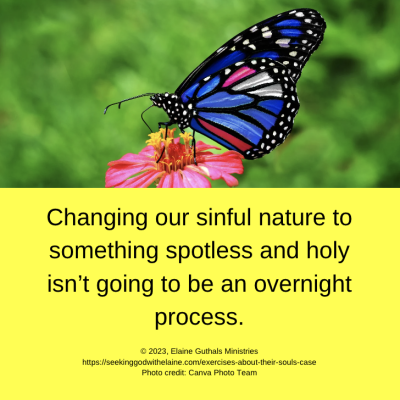
Fear
- We shouldn’t fear God but love Him because of a strong relationship (Different Principles, Motives, and Ends).
- Some people confess to God because they are afraid of the punishment that God’s Word says awaits sinners. They want the fire insurance (Different Principles, Motives, and Ends).
- We read about the vengeance and wrath of God and think we don’t have a chance. We would be wrong. If we don’t follow God because He is love but because we fear Him (and we are talking terror here, not awe) is that a genuine repentance? Answering that question is far above my pay grade, but I would guess it to be a resounding no. Think about it. Are we really following God if we haven’t repented? (Different Principles, Motives, and Ends)
- Fear doesn’t acknowledge our separation from God. It would rather the separation between us and Scary God remain. It doesn’t indicate we see the wrong in breaking God’s laws and commandments. It is focused on the consequences rather than the act itself. It doesn’t say anything about making the commitment to change our sinful ways to become obedient. It doesn’t take a realistic look at conviction and salvation.
- How can we expect God to reward us with eternal life when we have not submitted and navigated the Sanctification Road in this life? (Different Principles, Motives, and Ends)
- If the guilt doesn’t get us, the fear of doing wrong may. Many times, that is wound up in our faulty beliefs in God’s forgiveness. We either think God can’t forgive us because we are too sinful or that He won’t forgive us because we are too sinful (Different Feelings in Religion).
Making the Connections
- While godliness isn’t a feeling, contentment is. We all strive for contentment, regardless of whether we are striving for godliness or not (Different Feelings in Religion).
- Non-believers are convicted of their sins. Disciples are convicted of their sins. Backsliders are convicted of their sins (Different Feelings in Religion).
- The inward transformation must take place. We can’t be satisfied with only changing our outward being (Exercises about Their Soul’s Case).
- Everyone is going to be judged. Yes and no will be the only options available. Do we have a personal, growing relationship with Jesus or don’t we? (Death, Common to All, Leads to Eternity)
- The goats think they have done enough for admission to Heaven, just as the Matthew 7: 21 people do. Both find out they are wrong (Death, Common to All, Leads to Eternity).
- But if we look at this passage in Matthew more closely, we see both the sheep and the goats are surprised. The righteous were doing deeds because Jesus told them to do so. They were checking off a box. They weren’t doing the good deeds because that is to be our nature. The goats were doing good deeds to get recognition. We can’t tell them apart. That isn’t good. Jesus told us we should be different from the worldview people (Death, Common to All, Leads to Eternity).
- We won’t know who is a sheep or who is a goat until the separation happens at the Day of the Lord. Until then, we will have people thinking they are spending eternity with God — and they aren’t (The Difference between Outward and Inward Religion).
- Our relationship with God has an inward and outward aspect. We can’t have one and not the other. The inward aspects dictate the outward aspect, not the other way around. We have to show the fruit of our relationship with God through outward manifestation (Ways of Professing Religion).
- If life is eternal life, then the crown would be our reward. We will be rewarded with being perfected — having God’s character. The reward is given only when we attain God’s character (Different Principles, Motives, and Ends).
- We have to love God in order to receive our reward — our inheritance (Different Principles, Motives, and Ends).
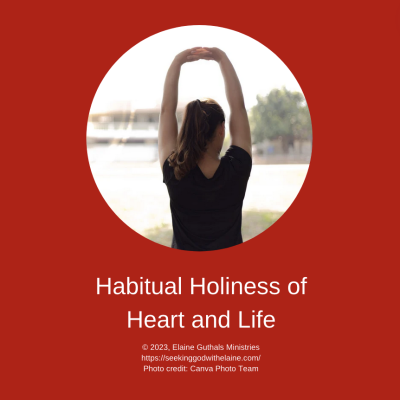
To read devotions in the Habitual Holiness of Heart and Life theme, click the button below.
Here is a running list of nuggets for the theme.
Devotions in the Outward and Inward Religion study
Here is a running list of nuggets for the study.
We are using Boston’s sermon as the foundation for this series.
